


|
|
Teach in OntarioVital program receives $2 million boostTeach in Ontario, the program that helps teachers from other countries become accredited in the province, has received $2 million in new federal and provincial funding. The money, $800,000 from Ontario and $1.2 million from Ottawa, will allow the bridging program for internationally educated teachers (IETs) to expand services in 2007 to 2010. Teach in Ontario – a partnership among the Ontario College of Teachers, the Ontario Teachers' Federation, LASI World Skills, Skills for Change and Windsor Women Working with Immigrant Women – has helped 1,130 IETs become certified since its inception in 2004. Teach in Ontario provides information and services such as counselling, document assistance and sector-specific language training, and has helped 630 IETs become job-ready through employment preparation courses. “This investment will help internationally educated teachers prepare for certification and work in education that matches their skills and training,” said Ontario Citizenship and Immigration Minister Mike Colle in making the funding announcement. “It will also help enrich Ontario's school community with new and diverse global perspectives.” College Registrar Brian McGowan added, “This funding recognizes the important work that Teach in Ontario has already done and will continue to do to help internationally educated teachers become certified in Ontario, find work and enrich the lives of Ontario's students.” Research – particularly the College's ongoing Transition to Teaching study – shows that existing program services aren't enough to help some IETs find jobs. The new funding will provide targeted employment-related services for IETs in Ottawa, Windsor and the Greater Toronto Area. Among the new services are classroom immersion, professional coaching and supply-teaching modules. The immersion component will enable IETs to observe classroom dynamics, interact with staff and students, and learn best practices and how to transfer their skills into the Ontario classroom setting. The professional coaching will match experienced educators with IETs who require support to make the transition to employment in publicly funded schools through the Ontario Teachers' Federation. Two-day supply-teaching workshops will provide IETs with the skills to be successful in this role. Teach in Ontario will also hold workshops to help community agency staff understand the certification process and the hiring practices of local school boards. Employers will be invited to workshops that will highlight the challenges IETs face when applying for jobs. The federal contribution comes under the new Canada-Ontario Immigration Agreement, designed to break down barriers for a wide range of professionals, including teachers. ps consultation |
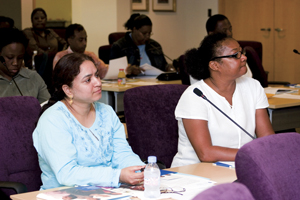 |
Newly licensed internationally educated teachers attend an information session in Toronto this summer. |
Delegations visit the College to share and gather information on a range of education issues, including accreditation, qualifications and standards of practice.
 |
Sweden: College Chair Don Cattani (left rear), Deputy Register Lise Roy-Kolbusz and External Relations Officer Kathy Anstett (right rear) welcomed teachers and administrators Ann-Katrin Hegart, Eva Lundberg, Pernilla Boström, Ingela Santesson and Anna Klarare. |
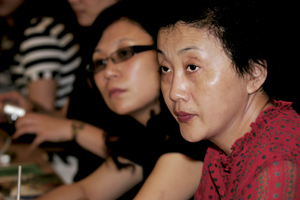 |
Shanghai: A delegation of principals visited the College in July. |
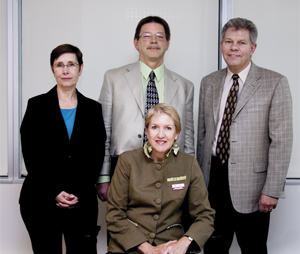 |
Australia: Principal Penny Verdich (foreground) met with College External Relations Officer Kathy Anstett, Chair Don Cattani and Accreditation Manager Kevin Lowe. |
York University's Faculty of Education, in collaboration with Glendon College, joins several other Ontario faculties this year to provide teacher-candidates with the opportunity to focus on French as a Second Language (FSL).
This concurrent program is designed to prepare teacher candidates to teach FSL from kindergarten to Grade 6, and will be offered at the Glendon campus, where at least half of the courses will be conducted in French.
Teacher candidates will do a significant portion of the practicum in French-immersion schools as well as in English-language elementary settings. To ensure mastery of the language and an understanding of francophone cultures, candidates will undertake their first-year community placements in francophone settings.
Graduates from the program will be eligible to enrol directly in the Additional Qualification course, FSL Part Two.
For more information visit www.edu.yorku.ca. Other faculties providing the primary/junior program with an FSL focus include those at Nipissing University, University of Western Ontario and University of Ottawa. ps
Internationally educated teachers and other professionals can find help at the newly launched Global Experience Ontario (GEO). A one-stop resource centre, GEO helps internationally trained or educated individuals navigate the accreditation process in some three dozen professions, including teaching. It provides information about licensing and registration processes, qualification standards, and how to complement existing skills and internships. Call 1-866-670-4094 or e-mail geo@ontario.ca for further information. ps
In our June 2006 edition, we reported that Professional Engineers of Ontario (PEO) had taken the province to court over legislation that undermined PEO's right to regulate the engineering profession. Specifically, PEO objected to Ontario Building Code amendments it said “duplicate, contradict and otherwise interfere with the important statutory role of PEO to license, discipline and regulate its members.” The amendments established a different qualification regime for engineers engaged in building design or review.
In May, the Ontario Superior Court backed PEO and declared the disputed legislation invalid. “This is a victory for all self-regulating professions in the province,” said PEO past president Patrick J. Quinn, PEng, who led the association's legal action against the government. ps
Canadian principals are generally pleased with their jobs, according to a Statistics Canada survey, but say that their heavy work load has a negative impact on family life.
Statistics Canada conducted the survey in the 2004–05 school year to evaluate the impact of changes in education on teaching and Canadian principals' work environment. The survey results were released in June.
It invited principals in about 4,800 schools to participate, and nearly half did so. There are approximately 15,200 elementary and secondary schools in Canada.
More than 80 per cent of the principals surveyed said they were “satisfied” or “very satisfied” with their job, but only slightly more than one-third (37 per cent) said they were satisfied with their job's impact on their family life. Just under half (47 per cent) said they were satisfied with the amount of work the job entailed.
When asked about their students and what factors interfered with their success, respondents cited deterioration in some families' finances, conflicts with fellow students and bullying as among the major problems.
The principals also said student lack of respect for teachers and student absenteeism were problematic. Nearly one-third cited issues such as students disrupting classes and student lateness and lack of interest.
Some responses varied by region. Principals in Québec and the Territories cited student dropouts, family poverty, student apathy and teacher turnover as challenges more often than those elsewhere in Canada. Principals in Québec and Ontario cited bullying more frequently than principals from other areas. Principals from the Territories were more likely to note problems with substance abuse and lateness or absenteeism.
Nearly all principals – about 90 per cent on average – reported that they were happy with their level of responsibility for the development of school policies, the assignment of students to classes or programs and the development of the school's mission or plan.
About one-third of the principals surveyed wanted to have less responsibility for fundraising, and about one in four wanted less emphasis on a variety of other tasks, such as collection, analysis and reporting of school data, resolving conflicts between school and families over values, and the training of parent members of school councils.
More than 80 per cent of principals in the Territories were male, compared to 53 per cent in Canada overall. Nationally, at the elementary level, 53 per cent of principals were female, but at the secondary level 68 per cent were male.
Six out of 10 principals held a master's degree or a doctorate, with the majority of these concentrated among secondary-level principals.
Many principals also teach as part of their regular duties. This is most common among younger principals and those who head small schools. ps
The StatsCan report on the survey (A profile of elementary and secondary school
principals in Canada: First results from the 2004–2005 Survey of Principals)
is available online at www.statcan.ca ![]() Publications
Publications ![]() Free internet publications
Free internet publications
![]() Education, training and learning
Education, training and learning ![]() Education Matters: Insights on Education,
Learning and Training in Canada.
Education Matters: Insights on Education,
Learning and Training in Canada.
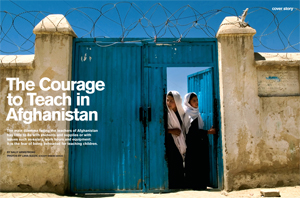 Professionally Speaking (ps) has won three prestigious Tabbie Awards in the
US-based international competition for trade, association and business publications.
There were more than 700 entries from around the world in 19 categories.
Professionally Speaking (ps) has won three prestigious Tabbie Awards in the
US-based international competition for trade, association and business publications.
There were more than 700 entries from around the world in 19 categories.
PS, which entered the contest for the first time this year, won two honourable
mentions for Courage in Afghanistan, a story by award-winning journalist and
humanitarian Sally Armstrong about the death threats 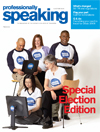 facing teachers in the
war-torn country. The story, which appeared in the December 2006 edition, won
in both the Feature Article and Opening Spread categories.
facing teachers in the
war-torn country. The story, which appeared in the December 2006 edition, won
in both the Feature Article and Opening Spread categories.
Last year's special issue on the College's Council elections won an honourable mention for its cover image promoting e-voting.
“This is very gratifying for a hard-working team and shows that we can compete with the best in the world,” said PS managing editor Joyce Mason. ps
Teachers now have a web site dedicated to discussing e-learning strategies. Called e-Community Ontario, the site emerged from a Mississauga symposium in May sponsored by e-Learning Ontario, a Ministry of Education initiative that provides e-learning courses and resources to school boards.
The new site allows educators to discuss the learning management system, the Ontario Educational Resource Bank and e-learning strategies. It also encourages collaboration on ways to integrate new technologies into teaching and learning.
Use of the site community.elearningontario.ca is free but restricted to Ontario educators. For more information about Ontario's e-learning strategy, visit www.elearningontario.ca. ps
High school students are being asked how to best combat cyberbullying and other Internet-related issues that have led to suspensions and debates over freedom of speech.
To understand the youth perspective, Education Minister Kathleen Wynne invited some 50 secondary school students from seven cities to attend a one-day forum about “respect and responsibility” in the online world. The forum took place in Toronto in May. The students discussed their use of the Internet, cell phones, iPods and social networking sites such as Facebook.
To combat cyberbullying, the students suggested solutions ranging from student-led awareness programs to alternative forms of discipline.
As a next step, the Ministry of Education is preparing a discussion paper on online respect and responsibility for distribution to Ontario schools this fall. There will be a follow-up conference in the spring. Meanwhile, students are encouraged to voice their opinions by e-mailing them to info@edu.gov.on.ca. ps
8 – International Literacy Day
www.un.org/depts/dhl/literacy/
16 – International Day for the Preservation of the Ozone Layer
The United Nations
celebrates the 20th anniversary of the historic Montreal Protocol.
www.unep.fr/ozonaction ![]() events
events
Women's History Month
www.swc-cfc.gc.ca
Canadian Library Month
www.cla.ca/clm07
1 – World Habitat Day
This year's theme, A Safe City Is a Just City, raises
awareness of mounting threats to urban safety and social justice caused by
crime, forced eviction and disasters, both natural and human-made.
www.unhabitat.org
1–5 – International Walk to School Week
www.goforgreen.ca/walktoschool
1–7 – National Family Week
www.familyservicecanada.org
5 – International World Teachers' Day
www.portal.unesco.org ![]() Education
Education ![]() UN Decades & International
Days
UN Decades & International
Days
5–11 – Veterans' Week
www.vac-acc.gc.ca
7 – Take Our Kids to Work Day
www.takeourkidstowork.ca
10 – International PEN Day of the Imprisoned Writer
www.internationalpen.org.uk
16 – International Day for Tolerance
www.un.org/depts/dhl/tolerance
20 – Universal Children's Day
www.un.org/depts/dhl/children_day
25 – International Day for the Elimination of Violence against Women
www.unifem.org/campaigns/november25
1 – World AIDS Day
www.worldaidsday.org
6 – National Day of Remembrance and Action on Violence against Women
Commemorates
the anniversary of the murder of 14 women at l'École Polytechnique de
Montréal on December 6, 1989.
www.swc-cfc.gc.ca
10 – Human Rights Day
www.un.org/av/special/hrday
For other international observances visit www.un.org and click on Conferences & Events
to the left of the UN logo, or try www.unac.org ![]() News & Events
News & Events ![]() UN Days,
Years and Decades
UN Days,
Years and Decades ![]() International Days and Weeks.
International Days and Weeks.